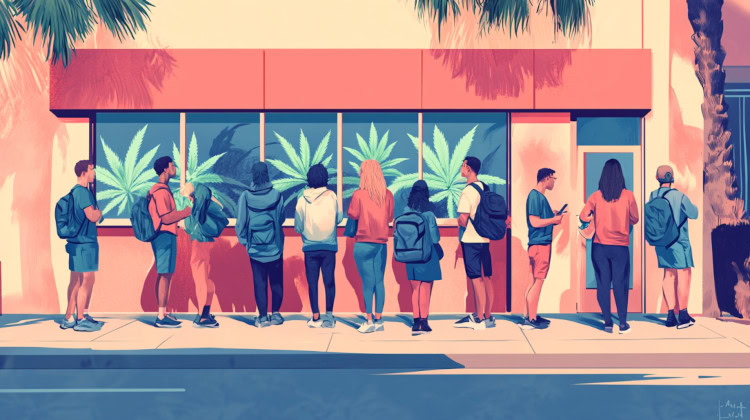In This Article
- States Proposing Regressive Policies
- New Jersey Pushes To Recriminalize Small Black Market Purchases
- New York Seeks To Allow Cannabis Odor As Probable Cause
- Ohio Senate Passes Further Restrictions On Legal Market
- Feds Proposing Regressive Policies Too
- No Schedule 280e Relief
- Rorhabacher-Farr Amendment At Risk
- We're Still Waiting To See The Final Picture
The colloquial definition of insanity is to do the same thing over and over again and expect different results. We don't really know where this phrase originated, but it's often attributed to Narcotics Anonymous literature from the 80s (and often incorrectly attributed to Albert Einstein).
Wherever the origin of the phrase, we have rarely seen it so aptly demonstrated as it has been throughout the War on Drugs. For decades since Nixon began this war in earnest, we've seen catastrophic social and economic damage as federal and state governments choose punitive approaches to addiction and black market sales rather than investing in true reform and medical care.
And now, following promises of rescheduling, we're seeing anti-cannabis fervor creep into our state and federal legislation again. Here are a few examples of this trend, and how these policies may directly affect consumers in the near future.
States Proposing Regressive Policies
New Jersey Pushes To Recriminalize Small Black Market Purchases
New Jersey State Senate President Scutari wants to re-criminalize even small purchases of cannabis from the black market. If this manages to drive black market consumers back to licensed stores, it could cause a spike in dispensary prices. But it's unlikely patients will see a very large effect in the near future. This is because history has shown that penalizing the consumer is unlikely to decrease black market demand.
The only effective means of combating the black market is to allow the legal market to provide competitive prices. But New Jersey’s legal markets are overburdened by regulations that make access limited and pricing unaffordable for average consumers, many of whom then turn to the black market. If re-criminalization proceeds, the most likely outcome would be fuller prisons without any decrease to black market trade.
It's illogical to penalize consumers for predictable behavior the state could address more effectively if it stops hampering legal cannabis operators with overly burdensome regulations.
New York Seeks To Allow Cannabis Odor As Probable Cause
New York wants to allow cannabis odor as probable cause to drug test drivers. This could penalize patients and consumers who are simply transporting their legally purchased cannabis from a state-licensed dispensary to their home.
Since we know that THC stays in a consumer's system for days, even weeks after any effects of use have passed, this could put any consumer who is transporting their cannabis from point A to point B at serious risk of a DUI, even if they aren't intoxicated while driving. Until we find a more scientific approach to determine actual intoxication, this is likely to create a burden for consumers while failing to address concerns, valid or not, about intoxicated driving.
If you live in New York, you might want to consider investing in odor proof containers if you need to transport your cannabis.
Ohio Senate Passes Further Restrictions On Legal Market
Ohio's State Senate passed a bill that will reduce consumer access by lowering purchase and home grow limits while simultaneously adding an extra layer of criminalization to cannabis purchased in other states.
This creates an unnecessary burden for consumers who rely on higher purchase or home cultivation limits, despite the fact that voters approved legalization by a margin of over 14%. It will also put consumers who are unaware of federal travel restrictions for cannabis at greater risk of criminal prosecution for otherwise legal and harmless behavior.
Feds Proposing Regressive Policies Too
States aren't the only ones seeking a return to prohibition policies. Congress is proposing a few bills and amendments that will halt rescheduling and rollback hard-won protections for legal shops.
No Schedule 280e Relief
One of the biggest appeals for cannabis rescheduling was that it would have granted relief from the punishing tax deduction restrictions in Schedule 280e of the tax code. The law currently forbids any businesses selling Schedule 1 drugs from deducting business expenses from their taxes, even if they're legitimate expenses under state law.
If cannabis were rescheduled to Schedule 3, this would purportedly allow these businesses to deduct those expenses and pay much lower taxes, resulting in much lower prices for consumers.
However, Congress is moving to block relief from Schedule 280e even if cannabis is rescheduled. It's a move that's likely to reduce support for rescheduling, which is already burdened by claims of DEA bias, regulators with a history of anti-cannabis statements, and efforts to block funding for rescheduling altogether.
Rorhabacher-Farr Amendment At Risk
The last session also saw efforts to curb the protections found in the Rorhabacher-Farr amendment, which could put state-legal cannabis businesses at risk of closure and prosecution.
The Rorhabacher Farr Amendment prohibits the federal government from using DoJ funds to prosecute state-legal cannabis activity. The new amendments from the last congressional session proposed to allow DoJ enforcement in most populated areas again.
This could make home delivery impossible in many areas, resulting in much longer drives to find a dispensary, and reducing access for patients with limited mobility.
We're Still Waiting To See The Final Picture
All of these actions could greatly reduce consumer and patient access to legal, lab-tested cannabis products. And these are just a few examples of regressive policy proposals and actions we are seeing.
As of February 28, 2025, the federal government is operating under a continuing resolution that extends funding through March 14, 2025. This continuing resolution was passed by Congress on December 20, 2024, to prevent a government shutdown.
The House of Representatives recently passed a budget resolution on February 25, 2025, outlining overall spending and revenue targets. However, this resolution does not provide detailed appropriations, so we don't yet know whether the language will include the strongly anti-cannabis amendments that were proposed last year.
Congress must pass the final appropriations bill by the March 14 deadline to avoid a shut down, but they also have the option of passing yet another continuing resolution to take a few more months to hash out the final details.
States are moving their own legislation along, but most state legislative sessions won't be complete for several weeks.
So, we'll just have to wait and see how these proposals pan out. Meanwhile, it's always a good idea to stock up, within legal limits, on your meds.
Catch up on the latest cannabis news, and sign up for NuggMD's Weekly Sesh newsletter for more consumer stories, tips, and recommendations.
The information in this article and any included images or charts are for educational purposes only. This information is neither a substitute for, nor does it replace, professional legal advice or medical advice, diagnosis, or treatment. If you have any concerns or questions about laws, regulations, or your health, you should always consult with an attorney, physician or other licensed professional.




